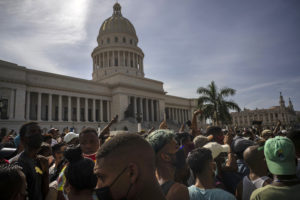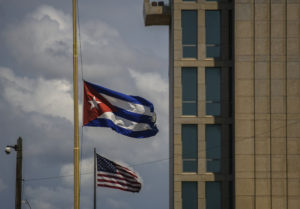Washington, D.C.—Yesterday, former Cuban president Fidel Castro died at the age of 90. Geoff Thale—Director of Programs at the Washington Office on Latin America (WOLA), a leading research and advocacy organization—issued the following statement:
“Fidel Castro was a monumental and deeply polarizing figure. He is being mourned in Cuba, in much of Latin America, and elsewhere for what he meant for Cuban independence and national pride, and as a leader in the struggle for self-determination. But at the same time, his critics are many, and he has been denounced as a leader for whom “national unity” meant a single party state with little tolerance for dissent, which in many cases resulted in human rights violations.
Fidel famously declared ‘History will absolve me,’ but history’s judgment of him and his legacy will be complicated. He dreamed of social progress, and under his rule, Cuba saw real achievements. For example, Cuba has a nearly universal literacy rate—an impressive achievement considering that the average among other lower-middle income countries is only 70.6 percent. In public health, Cuba’s infant mortality rate compares favorably with the United States. But history will weigh these alongside restrictions on freedom of speech and assembly and on intolerance of dissent.
His death is not unexpected—he was 90—and it will not provoke major political changes in Cuba. Fidel retired from political life several years ago. His younger brother Raúl remains in control and has announced his plan to retire in 2018, and there is a first vice-president who is expected to be his successor.
While the future of U.S.-Cuba relations remains uncertain, the process of economic and political reform in the island will likely continue. Raul Castro has shown a commitment to reform, and Fidel’s death is unlikely to change that commitment. Internal opponents who are critical of the process of reform toward a mixed economy and more open political debate will not be emboldened by Fidel’s passing.
Fidel Castro’s Cuba was marked by the conflicts of the Cold War. His passing comes two years after President Obama launched a new post-Cold War approach to Cuba, focused on normalizing relations and discussing the two nation’s differences in the context of ongoing trade and travel.
It is unclear whether the Trump Administration will take a pragmatic approach to U.S.-Cuba relations, but the death of Fidel Castro will make it more difficult to justify policies that are rooted in past ideologies rather than future opportunities.
The policies of the incoming Trump Administration on Cuba remain to be seen, but without Fidel, the dwindling group of supporters of the U.S. embargo in the United States will not have the most symbolic figure justifying continuing the embargo. The Trump administration should continue the process of engagement with Cuba and Congress should end the embargo once and for all. Backpedaling on the process of normalization would mean that the United States would isolate itself as Cuba moves further forward with political and economic reform.”



